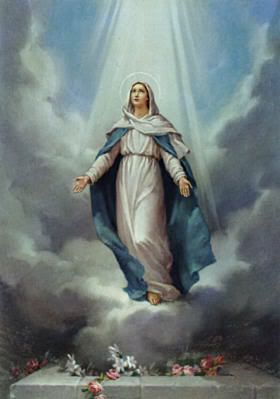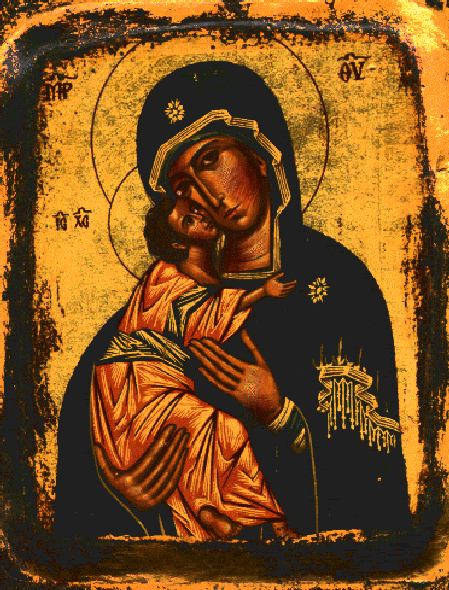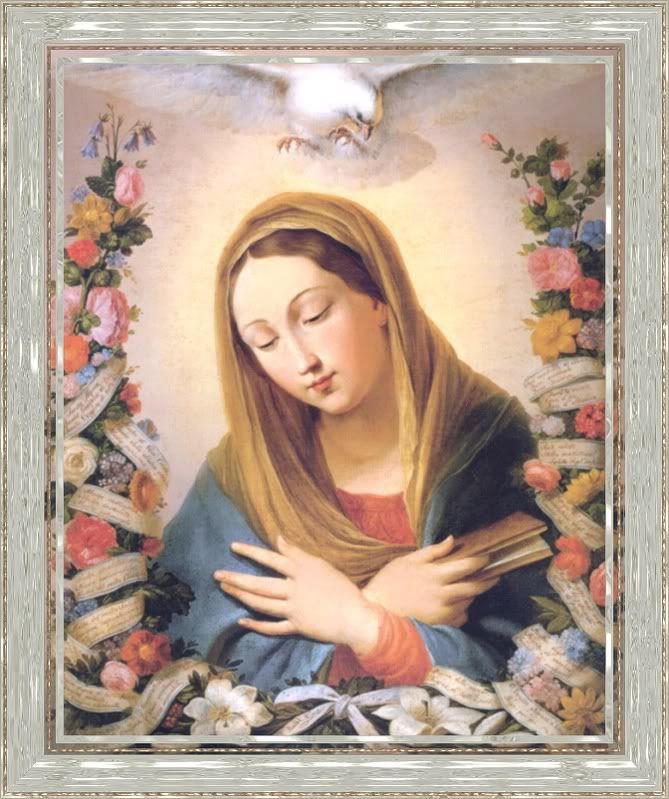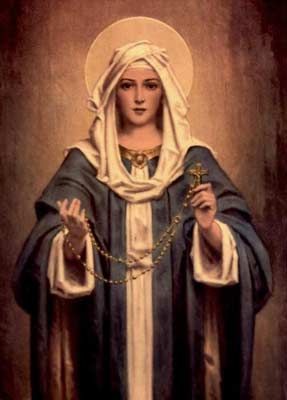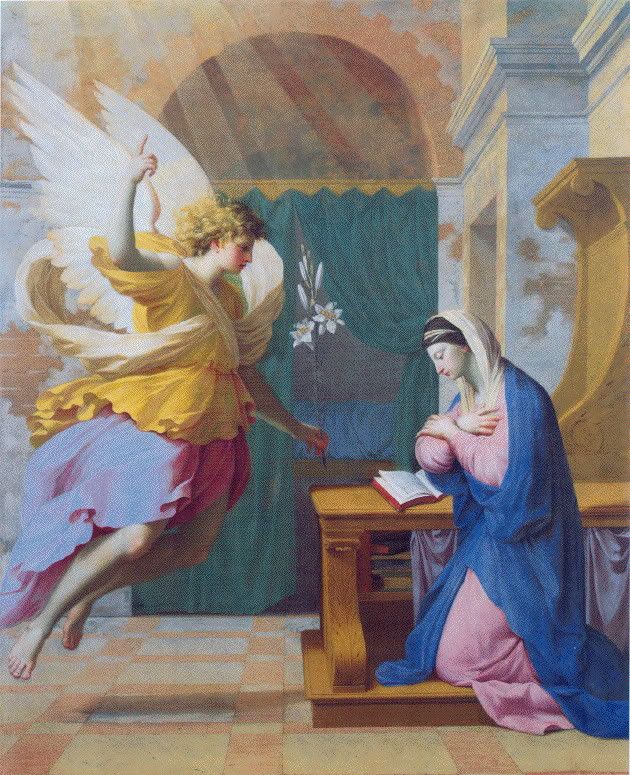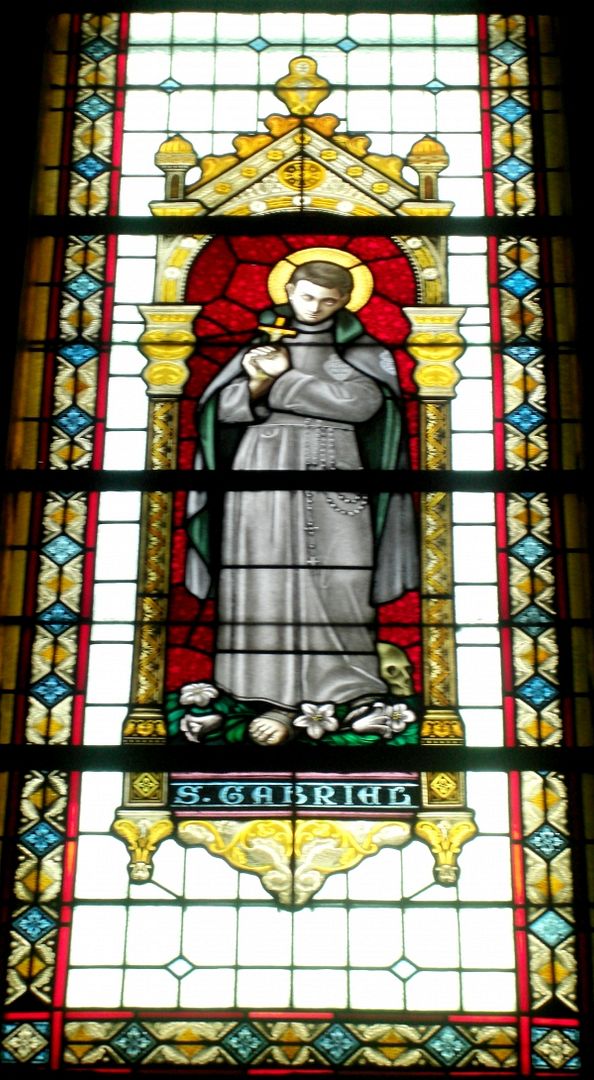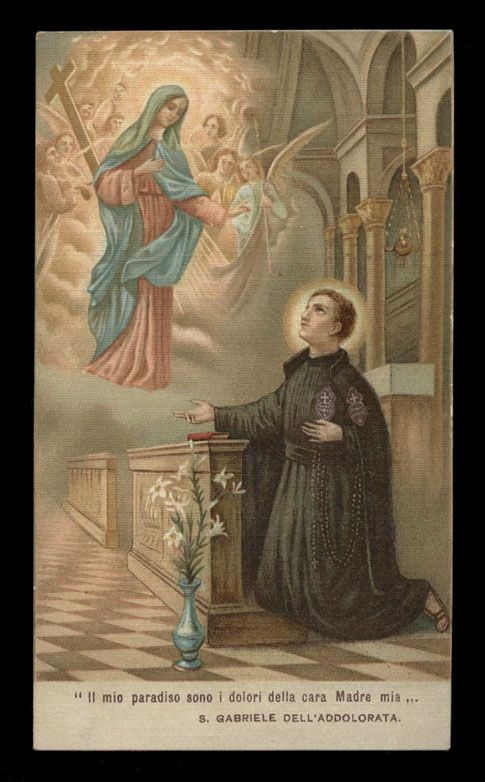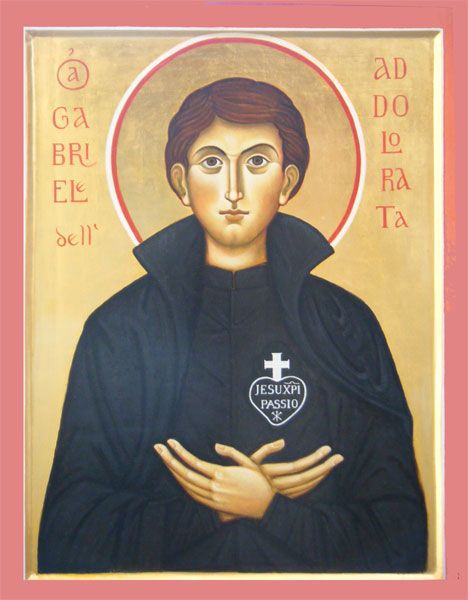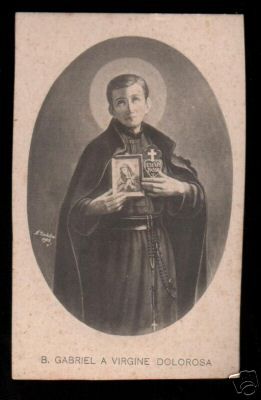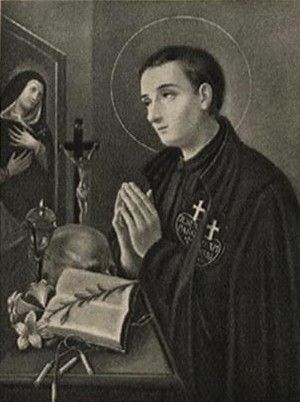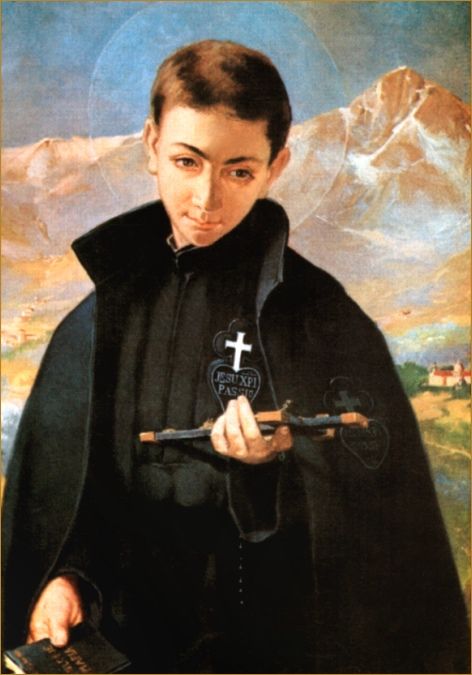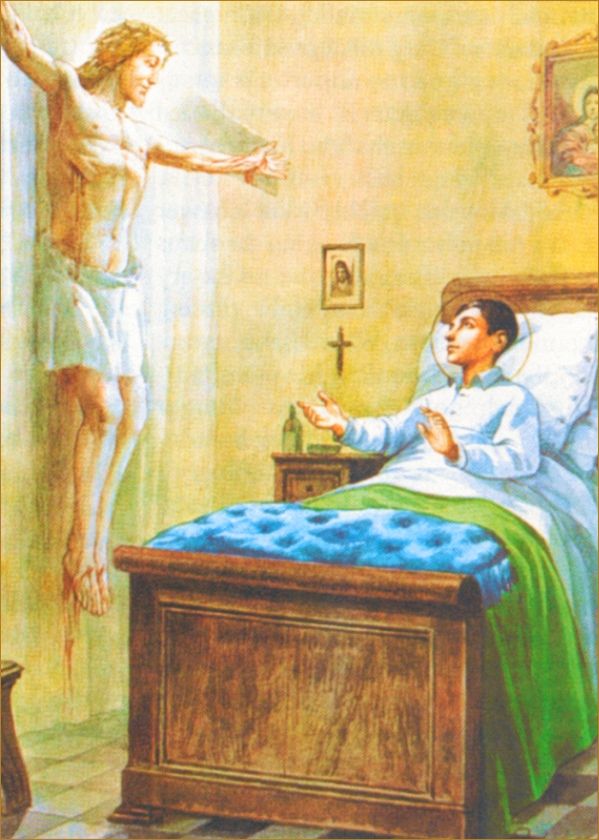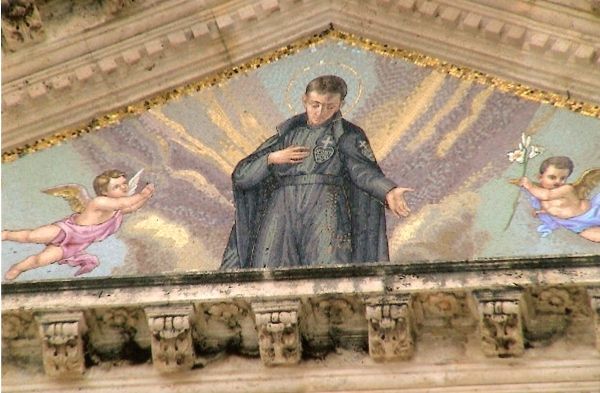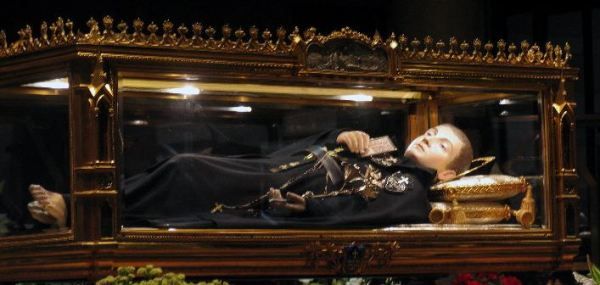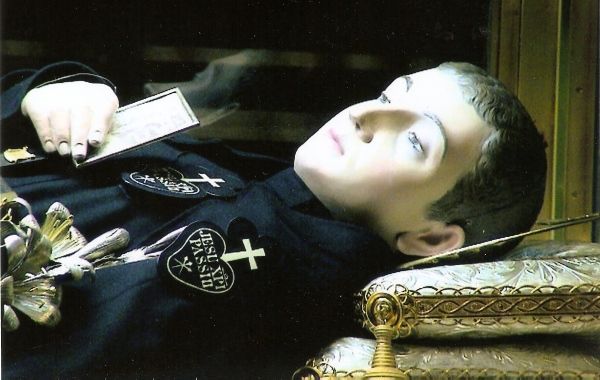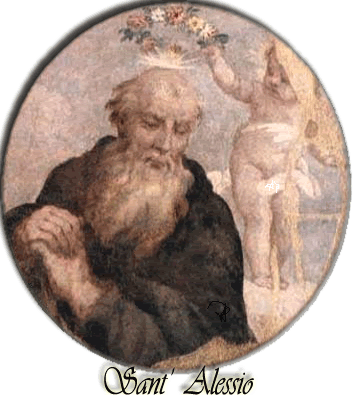Today, September 15, we celebrate the feast of Our Lady of Sorrows. In our communion with Mary, Our Blessed Mother, we recognize that we rarely experience joy without first enduring adversity. We ask Mary, who experienced great sorrow in her own life, to pray for us, so that, in the midst of our trials and tribulations, we may look forward to the joy that comes from remaining faithful witnesses to Christ.
The Stabat Mater is a thirteenth-century Latin hymn, the title meaning "the Mother was standing." Evocative of Mary, beneath the cross of the crucified Christ, this beautiful hymn (translated from the original Latin) describes the Sorrows of the Blessed Virgin at the Cross.
At the cross her station keeping,
Mary stood in sorrow weeping
When her Son was crucified.
While she waited in her anguish,
Seeing Christ in torment languish,
Bitter sorrow pierced her heart.
With what pain and desolation,
With what noble resignation,
Mary watched her dying Son.
Ever-patient in her yearning
Though her tear-filled eyes were burning,
Mary gazed upon her Son.
Who, that sorrow contemplating,
On that passion meditating,
Would not share the Virgin's grief?
Christ she saw, for our salvation,
Scourged with cruel acclamation,
Bruised and beaten by the rod.
Christ she saw with life-blood failing,
All her anguish unavailing,
Saw him breathe his very last.
Mary, fount of love's devotion,
Let me share with true emotion
All the sorrow you endured.
Virgin, ever interceding,
Hear me in my fervent pleading:
Fire me with your love of Christ.
Mother, may this prayer be granted:
That Christ's love may be implanted
In the depths of my poor soul.
At the cross, your sorrow sharing,
All your grief and torment bearing,
Let me stand and mourn with you.
Fairest maid of all creation,
Queen of hope and consolation,
Let me feel your grief sublime.
Virgin, in your love befriend me,
At the Judgment Day defend me.
Help me by your constant prayer.
Savior, when my life shall leave me,
Through your mother's prayers
receive me
With the fruits of victory.
Virgin of all virgins blest!
Listen to my fond request:
Let me share your grief divine
Let me, to my latest breath,
In my body bear the death
Of your dying Son divine.
Wounded with His every wound,
Steep my soul till it has swooned
In His very Blood away.
Be to me, O Virgin, nigh,
Lest in flames I burn and die,
In His awe-full judgment day.
Savior, when my life shall leave me,
Through your mother's prayers
receive me
With the fruits of victory.
While my body here decays
May my soul your goodness praise,
Safe in heaven eternally. Amen Alleluia.
Why pray the Rosary every day for a year?
Each time the Blessed Virgin has appeared-- whether it be to Saint Bernadette Soubirous at Lourdes; to Lucia, Jacinta, and Francisco at Fatima; or to Mariette Beco at Banneux-- she has asserted the importance, saving grace, and power of praying the Holy Rosary on a daily basis. Based upon her words, the Rosary is penance and conversion for sinners, a pathway to peace, an end to war, and a powerful act of faith in Jesus Christ. Pope Paul VI presented the Rosary as a powerful means to reach Christ "not merely with Mary but indeed, insofar as this is possible to us, in the same way as Mary, who is certainly the one who thought about Him more than anyone else has ever done."
To show us how this is done, perhaps no one has been more eloquent than the great Cardinal Newman, who wrote: "The great power of the Rosary consists in the fact that it translates the Creed into Prayer. Of course, the Creed is already in a certain sense a prayer and a great act of homage towards God, but the Rosary brings us to meditate again on the great truth of His life and death, and brings this truth close to our hearts. Even Christians, although they know God, usually fear rather than love Him. The strength of the Rosary lies in the particular manner in which it considers these mysteries, since all our thinking about Christ is intertwined with the thought of His Mother, in the relations between Mother and Son; the Holy Family is presented to us, the home in which God lived His infinite love."
As Mary said at Fatima, "Jesus wants to use you to make Me known and loved. He wishes to establish the devotion to My Immaculate Heart throughout the world. I promise salvation to whoever embraces it; these souls will be dear to God, like flowers put by Me to adorn his throne."

Today, September 15, we celebrate the feast of Our Lady of Sorrows. In our communion with Mary, Our Blessed Mother, we recognize that we rarely experience joy without first enduring adversity. We ask Mary, who experienced great sorrow in her own life, to pray for us, so that, in the midst of our trials and tribulations, we may look forward to the joy that comes from remaining faithful witnesses to Christ.
Our Blessed Mother endured great pain and sorrow throughout her life, beginning at the presentation of Jesus at the temple, persisting through His Passion, and remaining as Mary was left alone on earth, her Divine Son having been put to death. On this day, commemorating and celebrating Our Mother’s sorrow, we call to mind the pain endured both by Christ on the Cross and Mary, as she watched her Son be crucified. We ask for the grace to join in that sorrow, so that we may awaken to what is truly important-- not the passing joys of this life, but the lasting joy of eternal life in Heaven.
This feast is dedicated to the spiritual martyrdom of Mary, Mother of God, and her compassion with the sufferings of her Divine Son, Jesus. In her suffering as co-redeemer, she reminds us of the tremendous evil of sin and shows us the way of true repentance. By uniting ourselves with both the Passion of Christ and His holy Mother, we enter into Jesus' Heart and honor Him greatly; He is more honored because we have so honored His Mother.
The Seven Sorrows (or Dolors) or Mary are taken from Scriptural events. As Mary stood at the foot of the Cross on which Jesus hung, the sword of sorrow Simeon had foretold pierced her soul. Below are the seven sorrows of Mary:
The prophecy of Simeon (Luke 2:25-35)
The flight into Egypt (Matthew 2:13-15)
Loss of the Child Jesus for three days (Luke 2:41-50)
Mary meets Jesus on his way to Calvary (Luke 23:27-31; John 19:17)
Crucifixion and Death of Jesus (John 19:25-30)
The body of Jesus being taken from the Cross (Psalm 130; Luke 23:50-54; John 19:31-37)
The burial of Jesus (Isaiah 53:8; Luke 23:50-56; John 19:38-42; Mark 15:40-47)
Saint Bridget of Sweden was graced with a visitation from Our Lady of Sorrows, who made seven promises to those who meditate on Our Lady’s Tears and Dolors:
The Blessed Virgin grants seven graces to the souls who honor her daily by saying seven Hail Marys while meditating on her tears and dolors:
1. "I will grant peace to their families."
2. "They will be enlightened about the Divine Mysteries."
3. "I will console them in their pains and I will accompany them in their work."
4. "I will give them as much as they ask for as long as it does not oppose the adorable will of my Divine Son or the sanctification of their souls."
5. "I will defend them in their spiritual battles with the infernal enemy and I will protect them at every instant of their lives."
6. "I will visibly help them at the moment of their death--they will see the face of their mother."
7. "I have obtained this grace from my divine Son, that those who propagate this devotion to my tears and dolors will be taken directly from this earthly life to eternal happiness, since all their sins will be forgiven and my Son will be their eternal consolation and joy."
We pray today to Our Blessed Mother, that through our joining with her sorrows, we may find the joy of eternal salvation with Jesus Christ, Our Lord. We look to Mary as a model of forbearance and endurance, obedience and meekness, love, patience, and joyful suffering.
See also the Marian Creed of one of this blog's patrons, Saint Gabriel of Our Lady of Sorrows.
In Honor of the Sorrows of the Blessed Virgin Mary
O most holy and afflicted Virgin! Queen of Martyrs! thou who didst stand motionless beneath the Cross, witnessing the agony of thy expiring Son--through the unceasing sufferings of thy life of sorrow, and the bliss which now more than amply repays thee for thy past trials, look down with a mother's tenderness and pity on me, who kneel before thee to venerate thy dolors, and place my requests, with filial confidence, in the sanctuary of thy wounded heart; present them, I beseech thee, on my behalf, to Jesus Christ, through the merits of His own most sacred death and passion, together with thy sufferings at the foot of the cross, and through the united efficacy of both obtain the grant of my present petition. To whom shall I resort in my wants and miseries if not to thee, O Mother of Mercy, who, having so deeply drunk of the chalice of thy Son, canst compassionate the woes of those who still sigh in the land of exile? Offer for me to my Savior one drop of the Blood which flowed from His sacred veins, one of the tears which trickled from His divine eyes, one of the sighs which rent His adorable Heart. O refuge of the universe and hope of the whole world, do not reject my humble prayer, but graciously obtain the grant of my petition.
Year 2: Day 257 of 365
Prayer Intentions: Lives of joyful suffering.
Our Blessed Mother endured great pain and sorrow throughout her life, beginning at the presentation of Jesus at the temple, persisting through His Passion, and remaining as Mary was left alone on earth, her Divine Son having been put to death. On this day, commemorating and celebrating Our Mother’s sorrow, we call to mind the pain endured both by Christ on the Cross and Mary, as she watched her Son be crucified. We ask for the grace to join in that sorrow, so that we may awaken to what is truly important-- not the passing joys of this life, but the lasting joy of eternal life in Heaven.
This feast is dedicated to the spiritual martyrdom of Mary, Mother of God, and her compassion with the sufferings of her Divine Son, Jesus. In her suffering as co-redeemer, she reminds us of the tremendous evil of sin and shows us the way of true repentance. By uniting ourselves with both the Passion of Christ and His holy Mother, we enter into Jesus' Heart and honor Him greatly; He is more honored because we have so honored His Mother.
The Seven Sorrows (or Dolors) or Mary are taken from Scriptural events. As Mary stood at the foot of the Cross on which Jesus hung, the sword of sorrow Simeon had foretold pierced her soul. Below are the seven sorrows of Mary:
The prophecy of Simeon (Luke 2:25-35)
The flight into Egypt (Matthew 2:13-15)
Loss of the Child Jesus for three days (Luke 2:41-50)
Mary meets Jesus on his way to Calvary (Luke 23:27-31; John 19:17)
Crucifixion and Death of Jesus (John 19:25-30)
The body of Jesus being taken from the Cross (Psalm 130; Luke 23:50-54; John 19:31-37)
The burial of Jesus (Isaiah 53:8; Luke 23:50-56; John 19:38-42; Mark 15:40-47)
Saint Bridget of Sweden was graced with a visitation from Our Lady of Sorrows, who made seven promises to those who meditate on Our Lady’s Tears and Dolors:
The Blessed Virgin grants seven graces to the souls who honor her daily by saying seven Hail Marys while meditating on her tears and dolors:
1. "I will grant peace to their families."
2. "They will be enlightened about the Divine Mysteries."
3. "I will console them in their pains and I will accompany them in their work."
4. "I will give them as much as they ask for as long as it does not oppose the adorable will of my Divine Son or the sanctification of their souls."
5. "I will defend them in their spiritual battles with the infernal enemy and I will protect them at every instant of their lives."
6. "I will visibly help them at the moment of their death--they will see the face of their mother."
7. "I have obtained this grace from my divine Son, that those who propagate this devotion to my tears and dolors will be taken directly from this earthly life to eternal happiness, since all their sins will be forgiven and my Son will be their eternal consolation and joy."
We pray today to Our Blessed Mother, that through our joining with her sorrows, we may find the joy of eternal salvation with Jesus Christ, Our Lord. We look to Mary as a model of forbearance and endurance, obedience and meekness, love, patience, and joyful suffering.
See also the Marian Creed of one of this blog's patrons, Saint Gabriel of Our Lady of Sorrows.
In Honor of the Sorrows of the Blessed Virgin Mary
O most holy and afflicted Virgin! Queen of Martyrs! thou who didst stand motionless beneath the Cross, witnessing the agony of thy expiring Son--through the unceasing sufferings of thy life of sorrow, and the bliss which now more than amply repays thee for thy past trials, look down with a mother's tenderness and pity on me, who kneel before thee to venerate thy dolors, and place my requests, with filial confidence, in the sanctuary of thy wounded heart; present them, I beseech thee, on my behalf, to Jesus Christ, through the merits of His own most sacred death and passion, together with thy sufferings at the foot of the cross, and through the united efficacy of both obtain the grant of my present petition. To whom shall I resort in my wants and miseries if not to thee, O Mother of Mercy, who, having so deeply drunk of the chalice of thy Son, canst compassionate the woes of those who still sigh in the land of exile? Offer for me to my Savior one drop of the Blood which flowed from His sacred veins, one of the tears which trickled from His divine eyes, one of the sighs which rent His adorable Heart. O refuge of the universe and hope of the whole world, do not reject my humble prayer, but graciously obtain the grant of my petition.
Year 2: Day 257 of 365
Prayer Intentions: Lives of joyful suffering.
Requested Intentions: Clear speech for a child (C); Conversion of a family (A); Successful employment (S); For the healing of impaired vision (F); For a couple experiencing difficulties (L); Successful employment after finishing college (M); Mother’s health (A); Financial security, freedom from anxiety (S); For a son and cousins (L); Peace and civility (B); Successful examination results (D); Safety of family, strength, courage, wisdom (C); For the souls of a departed father and brother, finding of a suitable marriage partner (R); Successful pilgrimage, deepening of prayer life (R); Restoration of health (J); Restoration of health (S); Freedom from pride (A); For children and marriage (M); For the birth of a healthy baby (Y); For personal family intentions, for the sick, poor, hungry, and homeless (G); Financial security and peace (J); Grace, peace, and obedience to the will of God in a marriage (H); Successful and blessed marriage for sin, freedom from anxiety for husband, spiritual contentedness for family (N); Employment and health for a husband (B); Recovery and health of a mother (J); For a family to grow closer to the Church, salvation for all children (D); Successful employment (L); Successful employment (S); Renewal of faith life (A); Support for an intended marriage, health for friend and aunt (J); Mental health assistance for son (G); Freedom from illness (S); Successful employment (C).
Today, February 27, marks the feast day of Saint Gabriel of Our Lady of Sorrows (1838-1862), the patron saint of young people, students, and young religious. Saint Gabriel’s short life is marked by piety, faith, and obedience to the Lord, and religious vocation at the behest of Our Blessed Mother. While the last six years of his life, spent as a brother in the Passionist Order, were marked by humility, self-denial, and simplicity, Gabriel’s early life was quite the opposite. His complete consecration of his life to the Lord, despite the temptations of the modern world which he so loved, make his sacrifice a vivid example of the Christian love and obedience we should strive for.
The Marian Creed of Saint Gabriel of Our Lady of Sorrows
As translated by the Passionist website, http://stgabriel.wordpress.com/
I believe, as it was revealed to St. Matilda “that all you heard, you heard prudently, and with great thankfulness, and held yourself to be above no-one.” And with the blessed St. Elizabeth I hold firmly that “you held yourself of little value and unworthy of the grace of God.”
I believe, O Mother of my joy, as you revealed to St. Bridget “that you merited to be the Mother of God because you regarded nothing you possessed and nothing that you were came from yourself alone.”
I believe that your divine motherhood was hidden from St. Joseph out of your humility, until that time when it was necessary for it to be revealed.You served St. Elizabeth and always gave yourself the last place.
I believe, as was told to St. Bridget, “that those amongst you held the same lowly view of you as yourself because you thought and held that nothing you had or were came from you and so in no way gave yourself glory but only the Divine Benefactor and Creator.”
And I confess with St. Bernadine that there is no creature whose humility compares with yours and that in the world there is nothing to compare with even the smallest degree of your humility.
I believe that if all in the earth and sky were placed in the fire of love which you burned towards God that they would be consumed in an instant, and that even all the ardour of the seraphim cannot be compared to it.
I believe that you alone perfectly fulfilled the precept “You shall love the Lord your God”, that you surpassed all men and all angels in your love of God, from the first moment of your life, and even the blessed seraphim learn how to love God from your heart.
I believe with St. Bonaventure, that you were filled with a divine fire that never lost its spark and that, as it was revealed to St. Bridget “you did not think of anything but God, nor did anything please you but God.”
I believe with Suarez, Rupert, St. Bernadine, and St. Ambrose that “whilst your body rested, the spirit kept watch”. And that to you sleep seemed to impede the love of God, whence to you applies “I sleep, but my heart is awake”. And that whilst on earth you continuously loved God, that you did nothing that you knew would not be to His joy, and that you were full of all charity “as much as could be possible for a pure creature”, in such a way that “you struck the divine heart and seized him”.
I believe that your love for neighbour was so great that there neither was, nor ever shall be, one who has loved as much as you and thus there is no creature in the world such as you. And that if one united all the love that all the mothers of the world have ever carried for their children, of all wives for their husbands and of all saints and angels for their devotees, it does not even reach the love you have for but one soul and that the love all mothers have for their sons is a mere shadow of the love you have for us.
I say of you with St. Augustine: “Heaven itself was opened by your faith, when you gave your ‘fiat’ to the angel of the Annunciation.
I believe with Suarez that you have more faith than all men and angels, and that “though the disciples doubted, you did not doubt; therefore with St. Cyril I call you “sceptre of the orthodox faith”.
I believe that you are the “Mother of Holy Hope” and the model of confidence in God.
You were the most mortified of all beings: I believe what St. Epiphanius and the Damascene tell me, that you were mortified particularly in the eyes whose gaze you kept always to the ground and refused to fix them on anything.
I believe what you revealed to blessed St. Elizabeth, that you achieved no virtue without toil and prayer.
I believe what you told St. Bridget, that “whenever possible you chose to bear indignities, and you kept no extra clothes for yourself and ate only a little food.” I believe that you “regarded the riches of this world as nothing more than mud”.
I believe firmly that you chose to be poor.
I believe, as you revealed to St. Bridget, “that you are the Queen of Heaven, the Mother of Mercy, the Guide of the Just and the Way by which sinners return to God.” And that “nobody is so unfortunate that he lives without your mercy” and that “nobody is so rejected by God that, having called upon your name, he will not then return to God who will have mercy, but he who does not approach your mercy will ever be miserable”.
I believe that you are the mother of all men, and in the person of St. John you received all as your children, according to the will of Jesus.
I believe that you are, as you told St. Bridget, “the mother of all sinners who hope to amend their ways”, and that you intercede for the sinful soul, saying ‘Have mercy on me!’”
I believe that you are our life, “and after God, the one hope of sinners”, as St. Augustine said.
I believe of you what you showed St. Gertrude; with your open mantle many find refuge; lions, bears, tigers and that you not only seek out sinners, but with great pity you welcome and caress them.
Through you we receive the inestimable gift of holy perseverance: “following you I will not deviate, praying to you I will not despair, if you remain I shall not fall, if you protect me I shall have no fear, with you as my guide I shall not tire, you shall keep watch over me until I come to you.” (St. Bernard)
You are the hope of Christians, and their help, especially in death, for as you told St. Bridget “you go as a mother to meet them in death because there you give them consolation and relief.” And that “you will not” as you told to St. John of God, “you will not abandon your devotees in the hour of death.”
You are the hope of all, especially sinners, you are “the City of Refuge” and especially those deprived of all hope.”
You are the “protector of the condemned, the hope of the despairing”, and as St. Bridget heard Jesus say of you “even the devils ask your mercy humbly”. “You do not abhor the sinner, no matter how offensive he be, if he raises only a sigh to you.” Of you I say with St. Bernard, “You raise the pitiful for the abyss of despair”.
I believe that you wish to help all those who invoke you, and that you are “the salvation of those who invoke you”, and that “your love to do good to us is greater than our desire to receive it”.
I believe, as you revealed to St. Gertrude, that you soon open wide your mantle to welcome those who have recourse to you, and that the angels hasten to protect your clients from the furies of hell. You protect those who seek you, and even when we do not quickly call upon your name “you hasten to our aid”.
I believe, as you revealed to St. Bridget, that “demons at once leave the soul when they hear the name of Mary”.
I confess with S. Girolamo, Epiphanius, Anthony and others that your name descended from heaven itself and was given to you by order of the divine.
I believe with St. Anthony of Padua that in your name is the same sweetness that St. Bernard found in the name of Jesus: “Your name O Mary is joy to the heart, honey to the lips, music to the ears”.
I believe that after the name of Jesus “there is no other name by which men receive such grace, such hope, such consolation”.
And with St. Bonaventure I confess that “your name cannot be invoked without great spiritual advantage”.
And I believe what you told St. Bridget, that “that there is no-one in this life who is so cold toward the love of God, that if he called upon your name with the will to repent, the devil would be able to remain with him”.
I believe that your intercession is morally necessary for salvation, and that all the graces of God come through your hands, and that all of the mercies which are dispensed to men, all of them come through you, and that “no-one enters into heavens who has not first passed through you to come to that heavenly gate.”.
I believe that your intercession is not only useful, but morally necessary.
I believe that you are the co-operator of our justification, “the restorer of men, the authoress of the salvation of mankind, the restorer of all the human family, the co-helper of redemption, the saviouress of the world”, that all those who are not received into this ship [Mary] will be lost in the sea of this world, and thus I believe that “no-one enters through the door of salvation unless you open it to them”, and that “nobody is saved except through you”.
I believe that “God has decided to concede nothing, except through you”, that “our salvation lies in your hands” and that “those who are without your aid are like those trying to fly without wings”.
I believe also that “it would be fruitless to pray to other saints without your help”; and that “whilst all can obtain with you, you can obtain without all”; and that “if you be silent no-one will lend their aid, none pray, but if you pray, all will come to help and intercede.”
And finally I say of you with St. Thomas that you are “all the hope of life”, and of you I say with St. Augustine “I confess that you are alone and unique as our intercessor in heaven”.
I believe that you are the treasurer of Jesus and that “no-one receives anything from God, except through you”, and that “in you can be found every good”.
I say with St. Bernadine of Siena that “of all the favours concede by God in the old covenant I do not doubt that the greatest of all was given to you alone” (not excluding Jesus).
I believe that “one breath of yours contains more suffrage than all the saints put together” and I confess with St. John Damascene that “in truth you can save anyone”.
I believe that as an advocate you do not refuse to defend even the cause of the most miserable.
I say to you with St. Andrew of Crete “Hail, O Divine Reconciliatrix of men”. And with St. Germanus “there is no end to your patronage”.
You recognise the love between sinners and God, and I believe you are the Most Sweet, created by God to capture men, and especially sinners, to turn them back to Him, as He revealed to St. Catherine of Siena; and thus “as the magnet draws iron, in the same way you attract hard hearts”, as you told St. Bridget.
You are always on guard to sympathise and succour our miseries, thus I call you with St. Epiphanius “Most Attentive”, and this is confirmed in what St. Bridget heard Jesus ask of you “Mother, tell me, what do you desire?” and you replied “I ask compassion for the miserable”.
I believe in the intrinsic mercy of your maternal nature, that the pilgrimage you made on this earth to the poor is exceeded in greatness now that you reign in heaven, in the same way that the sun exceeds the moon in splendour, as St. Bonaventure tells me.
And that since the celestial bodies are illuminated by the sun, so then there is not anyone in the world who, through you, does not share in the divine mercy, as you revealed to St. Bridget.
Also I believe with St. Bonaventure that “You are offended, O Lady, not only by those who injure you, but also by those who do not pray to you”.
And the same saint persuades me that “whomsoever excels in paying you homage will be far from perdition” and I believe with St. Hilary that “Though one be even a great sinner, if they are devoted to you they will not perish for eternity.”
And I say with St. Bonaventure: “he who neglects you will die in his sins. He who does not invoke you in this life will not enter the Kingdom of Heaven; for those from whom you withdraw your glace, there is no hope of salvation”.
I believe with Anselm that “he for whom you once prayed will not be lost forever”. And that devotion to you is a sure sign of salvation, that God does not grant this grace except to those whom he wishes to save, as the Damascene assures me.
And I conclude with St. Anthony “It is impossible for those to be saved from whom you turn away your face, for it is necessary in order to be saved and glorified that you have your gaze fixed on us, for you are our sponsor.”
I believe, as you already revealed to St. Bridget, that you are the mother of all the souls in purgatory, that the pain which they merited by faults they committed in this life, are in some way mitigated by your prayers.
Gladly therefore I say of you with St. Alphonsus, “happy and fortunate are your devotees as St. Bernadine assures us that “you free from the torments of purgatory in a particular way, those who have been devoted to you.” St. Bridget confirms this with what she heard Jesus say to you “You are my mother, you are the Mother of Mercy, the consolation of all souls in purgatory.”
I believe that you, being about to enter into paradise, without a doubt obtained permission to take with you all the souls which you found then in purgatory.
I believe also, as you promised to Pope John XXII, that those who are enrolled in the Brown Scapular will be delivered by you from purgatory, on the Saturday after their death. But how happy are your devoted clients “for whom you shall open the gates of heaven.” You are “the entrance gate to the heavenly Jerusalem, the blessed gate of heaven, the path to paradise”.
I believe that “in [the heavenly] Jerusalem your power includes commanding whomsoever you will and similarly guiding into heaven whomsoever you will.” For you heaven is opened, hell is emptied, the heavenly Jerusalem is restored, the miserable at the point of damnation are restored to life.” (St. Bernard)
I believe that “he who listens to you shall not be confounded and those who labour under you shall not sin”, and I recognise in you the celestial pilot who leads to the eternal port your devotees who you recover in the vessel of your protection, as was shown to St. Mary Magdalene de’ Pazzi; and that devotion to you, as St. Bernard said, “is an infallible sign of eternal salvation”, and with Blessed Alan “that he who practises this devotion (the frequent recitation of the Hail Mary) is a sign of great worthiness of predestination to glory”.
And I conclude with the Abbot Guerric: “to serve the Queen of Heaven is to reign already in heaven and living in obedience to her commands is more than to reign”. I believe with St. Anthony that “of all the saints, none can be found with such compassion for the weak as you, O Most Blessed Virgin Mary”.
You give more than we ask of you: “Seeing our miseries you hasten to help us with your mercy”. “You are always working to secure our salvation.”
“How many” I say with the Abbot of Celles, “are those who are justly condemned in your Son’s justice, who you, being the Mother of Mercy, free from punishment”.
And I believe what the Lord told St. Bridget: “Without your intercession in prayer, one cannot hope for mercy.”
And I hold with St. Fulgensius that “the sky and the earth would have been destroyed long since, had your prayers not sustained them”.
I believe that you are higher than all the saints and angels, to whom you are superior, and that “such is your perfection, that God alone can know it”.
I believe that “after being God, there is being the Mother of God” and thus “you could not be more united to God without becoming God” (Albert the Great)
I believe that “the dignity of the Mother of God is infinite of its kind”; and that your state is the highest “that could be given to a pure creature”.
I confess with St. Bonaventure that “it is the greatest grace conferrable upon a pure creature to be Mother of God, and the greatest that God could give. God could create an enormous world, a vast heaven, but none greater could he make than the Mother of God”
I believe “that for you the world was created”, and that “by your order the world was sustained, that you were with him in creating all things” and that for love of you God did not destroy man after the Fall.
I believe that God has given you the greatest of all graces that in general and in particular He has given to all creature, and I believe what the Lord revealed to St. Bridget that your beauty surpasses that of all mankind and the angels.
I believe that your beauty dispels impure motives and generates purity.
I believe that you were like an infant but of this state you had only the innocence, not the defect of incapacity; you were a virgin first, but without the reproach of sterility, you were a mother, but a virgin.
You were occupied in the active life, but your labour did untangle your union with God; in contemplation you were recollected with God, but without neglect of your duties.
Death touched you but without distress or corruption of the body.
I believe with Albert the Great that you were the first who, without advice and without the example of another, offered to God your virginity, and give to Him all those who have imitated you and to whom you are the standard-bearer, and that for you your most pure spouse Joseph retained his virginity; and that to conserve virginity you would have happily renounced, with divine approval, the dignity of being the Mother of God.
The Marian Creed of Saint Gabriel of Our Lady of Sorrows
As translated by the Passionist website, http://stgabriel.wordpress.com/
I believe, as it was revealed to St. Matilda “that all you heard, you heard prudently, and with great thankfulness, and held yourself to be above no-one.” And with the blessed St. Elizabeth I hold firmly that “you held yourself of little value and unworthy of the grace of God.”
I believe, O Mother of my joy, as you revealed to St. Bridget “that you merited to be the Mother of God because you regarded nothing you possessed and nothing that you were came from yourself alone.”
I believe that your divine motherhood was hidden from St. Joseph out of your humility, until that time when it was necessary for it to be revealed.You served St. Elizabeth and always gave yourself the last place.
I believe, as was told to St. Bridget, “that those amongst you held the same lowly view of you as yourself because you thought and held that nothing you had or were came from you and so in no way gave yourself glory but only the Divine Benefactor and Creator.”
And I confess with St. Bernadine that there is no creature whose humility compares with yours and that in the world there is nothing to compare with even the smallest degree of your humility.
I believe that if all in the earth and sky were placed in the fire of love which you burned towards God that they would be consumed in an instant, and that even all the ardour of the seraphim cannot be compared to it.
I believe that you alone perfectly fulfilled the precept “You shall love the Lord your God”, that you surpassed all men and all angels in your love of God, from the first moment of your life, and even the blessed seraphim learn how to love God from your heart.
I believe with St. Bonaventure, that you were filled with a divine fire that never lost its spark and that, as it was revealed to St. Bridget “you did not think of anything but God, nor did anything please you but God.”
I believe with Suarez, Rupert, St. Bernadine, and St. Ambrose that “whilst your body rested, the spirit kept watch”. And that to you sleep seemed to impede the love of God, whence to you applies “I sleep, but my heart is awake”. And that whilst on earth you continuously loved God, that you did nothing that you knew would not be to His joy, and that you were full of all charity “as much as could be possible for a pure creature”, in such a way that “you struck the divine heart and seized him”.
I believe that your love for neighbour was so great that there neither was, nor ever shall be, one who has loved as much as you and thus there is no creature in the world such as you. And that if one united all the love that all the mothers of the world have ever carried for their children, of all wives for their husbands and of all saints and angels for their devotees, it does not even reach the love you have for but one soul and that the love all mothers have for their sons is a mere shadow of the love you have for us.
I say of you with St. Augustine: “Heaven itself was opened by your faith, when you gave your ‘fiat’ to the angel of the Annunciation.
I believe with Suarez that you have more faith than all men and angels, and that “though the disciples doubted, you did not doubt; therefore with St. Cyril I call you “sceptre of the orthodox faith”.
I believe that you are the “Mother of Holy Hope” and the model of confidence in God.
You were the most mortified of all beings: I believe what St. Epiphanius and the Damascene tell me, that you were mortified particularly in the eyes whose gaze you kept always to the ground and refused to fix them on anything.
I believe what you revealed to blessed St. Elizabeth, that you achieved no virtue without toil and prayer.
I believe what you told St. Bridget, that “whenever possible you chose to bear indignities, and you kept no extra clothes for yourself and ate only a little food.” I believe that you “regarded the riches of this world as nothing more than mud”.
I believe firmly that you chose to be poor.
I believe, as you revealed to St. Bridget, “that you are the Queen of Heaven, the Mother of Mercy, the Guide of the Just and the Way by which sinners return to God.” And that “nobody is so unfortunate that he lives without your mercy” and that “nobody is so rejected by God that, having called upon your name, he will not then return to God who will have mercy, but he who does not approach your mercy will ever be miserable”.
I believe that you are the mother of all men, and in the person of St. John you received all as your children, according to the will of Jesus.
I believe that you are, as you told St. Bridget, “the mother of all sinners who hope to amend their ways”, and that you intercede for the sinful soul, saying ‘Have mercy on me!’”
I believe that you are our life, “and after God, the one hope of sinners”, as St. Augustine said.
I believe of you what you showed St. Gertrude; with your open mantle many find refuge; lions, bears, tigers and that you not only seek out sinners, but with great pity you welcome and caress them.
Through you we receive the inestimable gift of holy perseverance: “following you I will not deviate, praying to you I will not despair, if you remain I shall not fall, if you protect me I shall have no fear, with you as my guide I shall not tire, you shall keep watch over me until I come to you.” (St. Bernard)
You are the hope of Christians, and their help, especially in death, for as you told St. Bridget “you go as a mother to meet them in death because there you give them consolation and relief.” And that “you will not” as you told to St. John of God, “you will not abandon your devotees in the hour of death.”
You are the hope of all, especially sinners, you are “the City of Refuge” and especially those deprived of all hope.”
You are the “protector of the condemned, the hope of the despairing”, and as St. Bridget heard Jesus say of you “even the devils ask your mercy humbly”. “You do not abhor the sinner, no matter how offensive he be, if he raises only a sigh to you.” Of you I say with St. Bernard, “You raise the pitiful for the abyss of despair”.
I believe that you wish to help all those who invoke you, and that you are “the salvation of those who invoke you”, and that “your love to do good to us is greater than our desire to receive it”.
I believe, as you revealed to St. Gertrude, that you soon open wide your mantle to welcome those who have recourse to you, and that the angels hasten to protect your clients from the furies of hell. You protect those who seek you, and even when we do not quickly call upon your name “you hasten to our aid”.
I believe, as you revealed to St. Bridget, that “demons at once leave the soul when they hear the name of Mary”.
I confess with S. Girolamo, Epiphanius, Anthony and others that your name descended from heaven itself and was given to you by order of the divine.
I believe with St. Anthony of Padua that in your name is the same sweetness that St. Bernard found in the name of Jesus: “Your name O Mary is joy to the heart, honey to the lips, music to the ears”.
I believe that after the name of Jesus “there is no other name by which men receive such grace, such hope, such consolation”.
And with St. Bonaventure I confess that “your name cannot be invoked without great spiritual advantage”.
And I believe what you told St. Bridget, that “that there is no-one in this life who is so cold toward the love of God, that if he called upon your name with the will to repent, the devil would be able to remain with him”.
I believe that your intercession is morally necessary for salvation, and that all the graces of God come through your hands, and that all of the mercies which are dispensed to men, all of them come through you, and that “no-one enters into heavens who has not first passed through you to come to that heavenly gate.”.
I believe that your intercession is not only useful, but morally necessary.
I believe that you are the co-operator of our justification, “the restorer of men, the authoress of the salvation of mankind, the restorer of all the human family, the co-helper of redemption, the saviouress of the world”, that all those who are not received into this ship [Mary] will be lost in the sea of this world, and thus I believe that “no-one enters through the door of salvation unless you open it to them”, and that “nobody is saved except through you”.
I believe that “God has decided to concede nothing, except through you”, that “our salvation lies in your hands” and that “those who are without your aid are like those trying to fly without wings”.
I believe also that “it would be fruitless to pray to other saints without your help”; and that “whilst all can obtain with you, you can obtain without all”; and that “if you be silent no-one will lend their aid, none pray, but if you pray, all will come to help and intercede.”
And finally I say of you with St. Thomas that you are “all the hope of life”, and of you I say with St. Augustine “I confess that you are alone and unique as our intercessor in heaven”.
I believe that you are the treasurer of Jesus and that “no-one receives anything from God, except through you”, and that “in you can be found every good”.
I say with St. Bernadine of Siena that “of all the favours concede by God in the old covenant I do not doubt that the greatest of all was given to you alone” (not excluding Jesus).
I believe that “one breath of yours contains more suffrage than all the saints put together” and I confess with St. John Damascene that “in truth you can save anyone”.
I believe that as an advocate you do not refuse to defend even the cause of the most miserable.
I say to you with St. Andrew of Crete “Hail, O Divine Reconciliatrix of men”. And with St. Germanus “there is no end to your patronage”.
You recognise the love between sinners and God, and I believe you are the Most Sweet, created by God to capture men, and especially sinners, to turn them back to Him, as He revealed to St. Catherine of Siena; and thus “as the magnet draws iron, in the same way you attract hard hearts”, as you told St. Bridget.
You are always on guard to sympathise and succour our miseries, thus I call you with St. Epiphanius “Most Attentive”, and this is confirmed in what St. Bridget heard Jesus ask of you “Mother, tell me, what do you desire?” and you replied “I ask compassion for the miserable”.
I believe in the intrinsic mercy of your maternal nature, that the pilgrimage you made on this earth to the poor is exceeded in greatness now that you reign in heaven, in the same way that the sun exceeds the moon in splendour, as St. Bonaventure tells me.
And that since the celestial bodies are illuminated by the sun, so then there is not anyone in the world who, through you, does not share in the divine mercy, as you revealed to St. Bridget.
Also I believe with St. Bonaventure that “You are offended, O Lady, not only by those who injure you, but also by those who do not pray to you”.
And the same saint persuades me that “whomsoever excels in paying you homage will be far from perdition” and I believe with St. Hilary that “Though one be even a great sinner, if they are devoted to you they will not perish for eternity.”
And I say with St. Bonaventure: “he who neglects you will die in his sins. He who does not invoke you in this life will not enter the Kingdom of Heaven; for those from whom you withdraw your glace, there is no hope of salvation”.
I believe with Anselm that “he for whom you once prayed will not be lost forever”. And that devotion to you is a sure sign of salvation, that God does not grant this grace except to those whom he wishes to save, as the Damascene assures me.
And I conclude with St. Anthony “It is impossible for those to be saved from whom you turn away your face, for it is necessary in order to be saved and glorified that you have your gaze fixed on us, for you are our sponsor.”
I believe, as you already revealed to St. Bridget, that you are the mother of all the souls in purgatory, that the pain which they merited by faults they committed in this life, are in some way mitigated by your prayers.
Gladly therefore I say of you with St. Alphonsus, “happy and fortunate are your devotees as St. Bernadine assures us that “you free from the torments of purgatory in a particular way, those who have been devoted to you.” St. Bridget confirms this with what she heard Jesus say to you “You are my mother, you are the Mother of Mercy, the consolation of all souls in purgatory.”
I believe that you, being about to enter into paradise, without a doubt obtained permission to take with you all the souls which you found then in purgatory.
I believe also, as you promised to Pope John XXII, that those who are enrolled in the Brown Scapular will be delivered by you from purgatory, on the Saturday after their death. But how happy are your devoted clients “for whom you shall open the gates of heaven.” You are “the entrance gate to the heavenly Jerusalem, the blessed gate of heaven, the path to paradise”.
I believe that “in [the heavenly] Jerusalem your power includes commanding whomsoever you will and similarly guiding into heaven whomsoever you will.” For you heaven is opened, hell is emptied, the heavenly Jerusalem is restored, the miserable at the point of damnation are restored to life.” (St. Bernard)
I believe that “he who listens to you shall not be confounded and those who labour under you shall not sin”, and I recognise in you the celestial pilot who leads to the eternal port your devotees who you recover in the vessel of your protection, as was shown to St. Mary Magdalene de’ Pazzi; and that devotion to you, as St. Bernard said, “is an infallible sign of eternal salvation”, and with Blessed Alan “that he who practises this devotion (the frequent recitation of the Hail Mary) is a sign of great worthiness of predestination to glory”.
And I conclude with the Abbot Guerric: “to serve the Queen of Heaven is to reign already in heaven and living in obedience to her commands is more than to reign”. I believe with St. Anthony that “of all the saints, none can be found with such compassion for the weak as you, O Most Blessed Virgin Mary”.
You give more than we ask of you: “Seeing our miseries you hasten to help us with your mercy”. “You are always working to secure our salvation.”
“How many” I say with the Abbot of Celles, “are those who are justly condemned in your Son’s justice, who you, being the Mother of Mercy, free from punishment”.
And I believe what the Lord told St. Bridget: “Without your intercession in prayer, one cannot hope for mercy.”
And I hold with St. Fulgensius that “the sky and the earth would have been destroyed long since, had your prayers not sustained them”.
I believe that you are higher than all the saints and angels, to whom you are superior, and that “such is your perfection, that God alone can know it”.
I believe that “after being God, there is being the Mother of God” and thus “you could not be more united to God without becoming God” (Albert the Great)
I believe that “the dignity of the Mother of God is infinite of its kind”; and that your state is the highest “that could be given to a pure creature”.
I confess with St. Bonaventure that “it is the greatest grace conferrable upon a pure creature to be Mother of God, and the greatest that God could give. God could create an enormous world, a vast heaven, but none greater could he make than the Mother of God”
I believe “that for you the world was created”, and that “by your order the world was sustained, that you were with him in creating all things” and that for love of you God did not destroy man after the Fall.
I believe that God has given you the greatest of all graces that in general and in particular He has given to all creature, and I believe what the Lord revealed to St. Bridget that your beauty surpasses that of all mankind and the angels.
I believe that your beauty dispels impure motives and generates purity.
I believe that you were like an infant but of this state you had only the innocence, not the defect of incapacity; you were a virgin first, but without the reproach of sterility, you were a mother, but a virgin.
You were occupied in the active life, but your labour did untangle your union with God; in contemplation you were recollected with God, but without neglect of your duties.
Death touched you but without distress or corruption of the body.
I believe with Albert the Great that you were the first who, without advice and without the example of another, offered to God your virginity, and give to Him all those who have imitated you and to whom you are the standard-bearer, and that for you your most pure spouse Joseph retained his virginity; and that to conserve virginity you would have happily renounced, with divine approval, the dignity of being the Mother of God.
“I will attempt day by day to break my will into pieces. I want to do God’s Holy Will, not my own!”
Today, February 27, we celebrate the feast of Saint Gabriel Possenti of Our Lady of Sorrows, one of the three patron saints I selected for this blog. I was moved by the life and works of Saint Gabriel last year, as I wrote and learned about his extraordinary faith and love for the Lord and Our Blessed Mother. The simple devotion, obedience, and all-consuming love that marked the short life of Saint Gabriel is an extraordinary example for each of us. I encourage you to read my short blog about his life and works, available here.
Saint Gabriel prayed before the cross every day. He humbly prayed for grace from Our Lord, finding his solace and comfort in the wounds of Christ.
“Behold me at Thy feet, O my Lord, begging Thy pity and mercy. What wilt Thou lose by granting me a deep love for Thee, a profound humility, a great purity of heart, of mind and of body, a fraternal charity, a sincere sorrow for having offended Thee, and the grace to offend Thee no more? What wilt Thou lose, O my God, by enabling me to receive worthily Thy Beloved Son in Holy Communion, by assisting me to act through love for Thee in all my thoughts, works, penances and prayers; by bestowing upon me the favor of loving Thy holy mother most tenderly and trustfully; the grace of final perseverance in my vocation, and of dying a good and holy death? I am a beggar covered with wounds and rags, asking for alms. Behold, O Lord, all my wretchedness! See my proud intellect, my cold and stony heart! See my mind filled with worldly thoughts, my will disposed to evil, and my body rebellious to every good work! Help me, O my God, to correct myself. This grace I implore through Thine own infinite goodness and mercy. To obtain it I offer Thee the merits of Thy Son, Jesus Christ, our Master and Redeemer. I have no merits of my own. I am destitute of all good, but His wounds are my hope: vulnera tua, merita mea. Had I shed my blood, for love of Thee, like Thy Son, wouldst Thou not grant me this favor? How much more oughtest Thou to hear me now, since He shed His blood for me. Art not Thou He who has promised in Thy gospel that whatsoever I ask for the good of my soul, Thou wilt grant me: ‘Ask and you shall receive.’ Now, as Thou canst not recall Thy word, I beseech Thee to hear me: I supplicate Thee through Thine infinite goodness, through the heart of Thy Son wounded with love for me through the infinite charity of the Holy Ghost, through the love Thou bearest toward Thy most holy daughter, Mary, and for the honour of the whole heavenly court, into which I ask Thee, one day, in Thy mercy to admit me. Amen.”
Saint Gabriel was further devoted to Our Blessed Mother, taking her name, and modeling his life after her own. At the time of his death, Saint Gabriel prayed to Our Blessed Mother, for her intercession and comfort, recognizing his suffering in that of hers beneath the cross.
“O Mother of Sorrows, by the anguish and love with which thou didst stand at the cross of Jesus, stand by me in my last agony. To thy maternal heart I commend the last three hours of my life. Offer these hours to the Eternal Father in union with the agony of our dearest Lord, in atonement for my sins. Offer to the Eternal Father the most precious blood of Jesus, mingled with your tears on Calvary, that I may obtain the grace of receiving Holy Communion with the most perfect love and contrition before my death, and that I may breathe forth my soul in the adorable presence of Jesus. Dearest Mother, when the moment of my death has at last come, present me as your child to Jesus. Ask Him to forgive me for having offended Him, for I knew not what I did. Beg Him to receive me into His kingdom of glory to be united with Him forever. Amen.”
I have previously posted excerpts from Saint Gabriel’s Marian Creed, which can be read here. For the full text of the translated Marian Creed of Saint Gabriel, see here.
“I will attempt day by day to break my will into pieces. I want to do God’s Holy Will, not my own”
“My life inside here [the Passionist house] is bursting with joy!”
“Love Mary!… She is loveable, faithful, constant. She will never let herself be outdone in love, but will ever remain supreme. If you are in danger, she will hasten to free you. If you are troubled, she will console you. If you are sick, she will bring you relief. If you are in need, she will help you. She does not look to see what kind of person you have been. She simply comes to a heart that wants to love her. She comes quickly and opens her merciful heart to you, embraces you and consoles and serves you. She will even be at hand to accompany you on the trip to eternity.”
“With sin, O Jesus, I gave you the death, but I do not despair of your forgiveness. Those scourges call me, those arms extended invite me, that injured Heart offers me a secure shelter.”
“Who it will be able ever to repeat the pains, the strains and the sufferings that Jesus suffered in such little time. We see Jesus in the garden of the olives, after being separated from His Sorrowful mother, how he is pale and trembling with fear, his face to the ground!”
“Mary, dear Mother of mine, come fast!”
“You [O Mary] answered with the “fiat” to the announcement of the angel, do not want our ruin; show love and pity.”
“My life is a continuous delight; what I experience inside these sacred walls is almost inexpressible; the 24 hours of the day seem to me like 24 short instants; really my life is full of delight.”
“Our perfection does not consist of doing extraordinary things but to do the ordinary well.”
“My sole merit lies in Your wounds.”
“Father, tell me if in my heart there is something that does not please God, because it I want to rip it out.”
“. . . fidelity in little things must be the basic rule in striving for holiness,”
“Do not bestow your love on the world.”
Saint Gabriel modeled his life on that of Christ and Our Blessed Mother, committing himself to embody every virtue and shun every sin. To that end, he committed to writing a list of 41 Resolutions, guiding his daily life, which can be read here.
O angelic young Gabriel, who, with your ardent love for Jesus Crucified and your compassion for Our Lady of Sorrows, were on earth a mirror of innocence and an example of every virtue; we turn to you full of confidence to implore your aid. Oh! How many evil things and afflictions O how many dangers, assail our young people from every side, seeking to make them lose the faith. You, who lived always a life of faith, who amongst the temptations of the world maintained purity and virginity; turn your eyes to us, cast us a compassionate and pitying glance! Help us to have the grace to persevere in faith; we invoke your name; we cannot doubt the effactiousness of your patronage! In full confidence of our hope in you, we pray, O Sweet Saint, to obtain this particular grace for the greater glory of God and for the good of souls (here mention your request). Finally, obtain for us from Jesus Christ Crucified, through Mary, Our Lady of Sorrows, resignation and peace so that we might always live the Christian life, throughout all the times of this present life, so that we might one day be happy with you in the presence of our Heavenly Father. Amen
Year 2: Day 58 of 365
Prayer Intentions: Simple faith, obedience, and love.
Requested Intentions: Freedom from medical difficulties, employment, successful relationship (D); End to suffering for sick brother; reconciliation of estranged family (E); End to husband’s addiction; Improved relationship; strength (M); Successful God-centered marriage; Sacramental life (M); Healing, successful relationship (S); For successful marriage (A); For a husband’s freedom from addiction (C); Freedom from pain and illness for a friend (M); Financial freedom (J); Successful passing of occupational examination (S); Healing and conversion, sale of house (L); Occupational success for employee and colleagues (J); Employment for a son (C); Successful attainment of an important appointed position (J); Recovery from cancer for a friend (Z); For a family’s freedom from sin (M); For a daughter with Diabetes (A); Healing of a father following stroke (S).
Today, February 27, we celebrate the feast of Saint Gabriel Possenti of Our Lady of Sorrows, one of the three patron saints I selected for this blog. I was moved by the life and works of Saint Gabriel last year, as I wrote and learned about his extraordinary faith and love for the Lord and Our Blessed Mother. The simple devotion, obedience, and all-consuming love that marked the short life of Saint Gabriel is an extraordinary example for each of us. I encourage you to read my short blog about his life and works, available here.
Saint Gabriel prayed before the cross every day. He humbly prayed for grace from Our Lord, finding his solace and comfort in the wounds of Christ.
“Behold me at Thy feet, O my Lord, begging Thy pity and mercy. What wilt Thou lose by granting me a deep love for Thee, a profound humility, a great purity of heart, of mind and of body, a fraternal charity, a sincere sorrow for having offended Thee, and the grace to offend Thee no more? What wilt Thou lose, O my God, by enabling me to receive worthily Thy Beloved Son in Holy Communion, by assisting me to act through love for Thee in all my thoughts, works, penances and prayers; by bestowing upon me the favor of loving Thy holy mother most tenderly and trustfully; the grace of final perseverance in my vocation, and of dying a good and holy death? I am a beggar covered with wounds and rags, asking for alms. Behold, O Lord, all my wretchedness! See my proud intellect, my cold and stony heart! See my mind filled with worldly thoughts, my will disposed to evil, and my body rebellious to every good work! Help me, O my God, to correct myself. This grace I implore through Thine own infinite goodness and mercy. To obtain it I offer Thee the merits of Thy Son, Jesus Christ, our Master and Redeemer. I have no merits of my own. I am destitute of all good, but His wounds are my hope: vulnera tua, merita mea. Had I shed my blood, for love of Thee, like Thy Son, wouldst Thou not grant me this favor? How much more oughtest Thou to hear me now, since He shed His blood for me. Art not Thou He who has promised in Thy gospel that whatsoever I ask for the good of my soul, Thou wilt grant me: ‘Ask and you shall receive.’ Now, as Thou canst not recall Thy word, I beseech Thee to hear me: I supplicate Thee through Thine infinite goodness, through the heart of Thy Son wounded with love for me through the infinite charity of the Holy Ghost, through the love Thou bearest toward Thy most holy daughter, Mary, and for the honour of the whole heavenly court, into which I ask Thee, one day, in Thy mercy to admit me. Amen.”
Saint Gabriel was further devoted to Our Blessed Mother, taking her name, and modeling his life after her own. At the time of his death, Saint Gabriel prayed to Our Blessed Mother, for her intercession and comfort, recognizing his suffering in that of hers beneath the cross.
“O Mother of Sorrows, by the anguish and love with which thou didst stand at the cross of Jesus, stand by me in my last agony. To thy maternal heart I commend the last three hours of my life. Offer these hours to the Eternal Father in union with the agony of our dearest Lord, in atonement for my sins. Offer to the Eternal Father the most precious blood of Jesus, mingled with your tears on Calvary, that I may obtain the grace of receiving Holy Communion with the most perfect love and contrition before my death, and that I may breathe forth my soul in the adorable presence of Jesus. Dearest Mother, when the moment of my death has at last come, present me as your child to Jesus. Ask Him to forgive me for having offended Him, for I knew not what I did. Beg Him to receive me into His kingdom of glory to be united with Him forever. Amen.”
I have previously posted excerpts from Saint Gabriel’s Marian Creed, which can be read here. For the full text of the translated Marian Creed of Saint Gabriel, see here.
Select Quotations from Saint Gabriel of Our Lady of Sorrows
“I will attempt day by day to break my will into pieces. I want to do God’s Holy Will, not my own”
“My life inside here [the Passionist house] is bursting with joy!”
“Love Mary!… She is loveable, faithful, constant. She will never let herself be outdone in love, but will ever remain supreme. If you are in danger, she will hasten to free you. If you are troubled, she will console you. If you are sick, she will bring you relief. If you are in need, she will help you. She does not look to see what kind of person you have been. She simply comes to a heart that wants to love her. She comes quickly and opens her merciful heart to you, embraces you and consoles and serves you. She will even be at hand to accompany you on the trip to eternity.”
“With sin, O Jesus, I gave you the death, but I do not despair of your forgiveness. Those scourges call me, those arms extended invite me, that injured Heart offers me a secure shelter.”
“Who it will be able ever to repeat the pains, the strains and the sufferings that Jesus suffered in such little time. We see Jesus in the garden of the olives, after being separated from His Sorrowful mother, how he is pale and trembling with fear, his face to the ground!”
“Mary, dear Mother of mine, come fast!”
“You [O Mary] answered with the “fiat” to the announcement of the angel, do not want our ruin; show love and pity.”
“My life is a continuous delight; what I experience inside these sacred walls is almost inexpressible; the 24 hours of the day seem to me like 24 short instants; really my life is full of delight.”
“Our perfection does not consist of doing extraordinary things but to do the ordinary well.”
“My sole merit lies in Your wounds.”
“Father, tell me if in my heart there is something that does not please God, because it I want to rip it out.”
“. . . fidelity in little things must be the basic rule in striving for holiness,”
“Do not bestow your love on the world.”
Saint Gabriel modeled his life on that of Christ and Our Blessed Mother, committing himself to embody every virtue and shun every sin. To that end, he committed to writing a list of 41 Resolutions, guiding his daily life, which can be read here.
O angelic young Gabriel, who, with your ardent love for Jesus Crucified and your compassion for Our Lady of Sorrows, were on earth a mirror of innocence and an example of every virtue; we turn to you full of confidence to implore your aid. Oh! How many evil things and afflictions O how many dangers, assail our young people from every side, seeking to make them lose the faith. You, who lived always a life of faith, who amongst the temptations of the world maintained purity and virginity; turn your eyes to us, cast us a compassionate and pitying glance! Help us to have the grace to persevere in faith; we invoke your name; we cannot doubt the effactiousness of your patronage! In full confidence of our hope in you, we pray, O Sweet Saint, to obtain this particular grace for the greater glory of God and for the good of souls (here mention your request). Finally, obtain for us from Jesus Christ Crucified, through Mary, Our Lady of Sorrows, resignation and peace so that we might always live the Christian life, throughout all the times of this present life, so that we might one day be happy with you in the presence of our Heavenly Father. Amen
Year 2: Day 58 of 365
Prayer Intentions: Simple faith, obedience, and love.
Requested Intentions: Freedom from medical difficulties, employment, successful relationship (D); End to suffering for sick brother; reconciliation of estranged family (E); End to husband’s addiction; Improved relationship; strength (M); Successful God-centered marriage; Sacramental life (M); Healing, successful relationship (S); For successful marriage (A); For a husband’s freedom from addiction (C); Freedom from pain and illness for a friend (M); Financial freedom (J); Successful passing of occupational examination (S); Healing and conversion, sale of house (L); Occupational success for employee and colleagues (J); Employment for a son (C); Successful attainment of an important appointed position (J); Recovery from cancer for a friend (Z); For a family’s freedom from sin (M); For a daughter with Diabetes (A); Healing of a father following stroke (S).
comments (0)
|
Labels:
Feast Day,
Humility,
Love,
Marian Devotion,
Our Lady of Sorrows,
Patron Saint,
Saints,
Suffering
February 17: Saint Alexis Falconieri and the Seven Holy Founders of the Servite Order
Posted by Jacob
Saint Alexis Falconieri, whose feast day we celebrate on February 17, is also known as one of the Seven Holy Founders of the Servants of Mary, or the Servite Order. Together, these seven prominent men in Florentine society, gave up their influential lives, fortunes, and oftentimes marriages, to consecrate themselves to Our Blessed Mother, and serve others at her direction.
Alexis Falconieri (born 1200, died 1310) was born the son of a Florentine merchant prince and leader of government. He enjoyed the privilege and status of the rich and powerful, but instead of embracing those privileges, chose a life of profound humility and piety.
At that time, Florence was a prosperous city, the center of government and art in Italy. It was also a time period of great political strife, and religious heresy. It was in that climate that Saint Alexis joined the Laudesi, a pious confraternity of the Blessed Virgin. Here he met six other young men, all members of the most prominent Florentine families, who would come to be known as the Seven Holy Founders. Their ranks included Saints Buonfiglio Monaldi , John Bonagiunta, Benedict dell’Antella, Bartholomew Amidei, Gerard Sostegni, and Ricoverus Uguccione.
Together, on the Feast of the Assumption of the Blessed Virgin in 1240, Our Lady appeared to them carrying a black habit, and a nearby angel bore a scroll reading Servants of Mary. She told them:
“You will found a new Order, and you will be my witnesses throughout the world. This is your name: Servants of Mary. This is your rule: that of Saint Augustine. And here is your distinctive sign: the black scapular, in memory of my sufferings at the foot of the Cross.”
The Seven promptly founded the Ordo fratrum Servorum Beatae Mariae Virginis, the Servite Friars, or Servants of Mary. Servites make solemn vows of poverty, chastity, and obedience, as instructed by Mary, following the Rule of Saint Augustine. Their mission is to sanctify all men through devotion to the Mother of God, especially in her desolation during the Passion of her Divine Son. The Servites give missions, have the care of souls, or teach in higher institutions of learning. Given their devotion to the sorrows of the Blessed Virgin, the Rosary of the Seven Dolors (or Sorrows) is a common devotion within the order. During this devotion, one meditates on the seven moments of suffering enduring by the Blessed Virgin during the life of Jesus:
1. The Prophecy of Simeon over the Infant Jesus during the Presentation in the Temple. (Luke 2:34)
2. The Flight into Egypt of the Holy Family. (Matthew 2:13)
3. The Loss of the Child Jesus for Three Days, and the finding of Him in the Temple. (Luke 2:43)
4. The Meeting of Jesus and Mary while He carried His cross. (Luke 23:26)
5. The Crucifixion, where Mary stands at the foot of the cross. (John 19:25)
6. The Descent from the Cross, where Mary receives the dead body of Jesus in her arms. (Matthew 27:57)
7. The Burial of Jesus. (John 19:40)
The Feast of Our Lady of Sorrows is celebrated on September 15.
Following the founding of the Servite Order, six of the Seven Holy Founders took the vows of priesthood, as ordained by the bishop. Only Saint Alexis, due to his humility and feelings of unworthiness to serve, chose to remain a lay brother. He was the face of the Servite community within greater Florentine society, raising money through begging, tending to the buildling of new facilities due to the rapid expansion of the Order, and generally serving his brothers through seeing to even the most menial of tasks. Pope Benedict XI approved the order in 1304, with Saint Alexis being the only founding member still living. During that time, more than ten thousand members had joined the Order.
Today, the Servite Order has spread throughout the world, continuing through its devotion to Mary to serve and educate the poor. One of the five original mendicant orders, the Servites are 100% dependant on charitable contributions to survive, neither owning nor desiring to own any individual or group posessions. All they have, they give.
Saint Alexis Falconieri and his holy colleagues were granted the privilige of a vision of the Blessed Mother, specifically giving them direction on where to move the course of their lives. This, of course, happened only after they had committed themselves to the Lord, and given up the ties to their earthly lives—including possessions and even wives! While this may seem extreme to us, the influence of their sacrifices remains today in the flourishing Servite Order, begging us to ask the question: what might we accomplish if we turn from our material ties and focus our lives on God? How might we better serve Him and each other?
Year 2: Day 48 of 365
Prayer Intentions: Lives focused on the Lord
Requested Intentions: Financial freedom (J); Successful passing of occupational examination (S); Healing and conversion, sale of house (L); Occupational success for employee and colleagues (J); Employment for a son (C); Successful attainment of an important appointed position (J); Recovery from cancer for a friend (Z); For a family’s freedom from sin (M); For a daughter with Diabetes (A); Reconciliation of a marriage (D); Assistance with a legal matter, financial freedom (R); Healing for a friend (M); For a son in medical school (H); Financial assistance (M); Successful employment (N): Freedom from mental illness for a friend (L); For successful marriage (N); For friends having and recovering from surgery; for the reduction of a brain tumor (L); For resolution of a housing crisis (P); For a brother who is struggling financially, for a son who is struggling academically (B); For financial security for a friend (C); Success in business; familial happiness and health (J); Health and recovery of a sister (I); Healing of a father following stroke (S).
Alexis Falconieri (born 1200, died 1310) was born the son of a Florentine merchant prince and leader of government. He enjoyed the privilege and status of the rich and powerful, but instead of embracing those privileges, chose a life of profound humility and piety.
At that time, Florence was a prosperous city, the center of government and art in Italy. It was also a time period of great political strife, and religious heresy. It was in that climate that Saint Alexis joined the Laudesi, a pious confraternity of the Blessed Virgin. Here he met six other young men, all members of the most prominent Florentine families, who would come to be known as the Seven Holy Founders. Their ranks included Saints Buonfiglio Monaldi , John Bonagiunta, Benedict dell’Antella, Bartholomew Amidei, Gerard Sostegni, and Ricoverus Uguccione.
Together, on the Feast of the Assumption of the Blessed Virgin in 1240, Our Lady appeared to them carrying a black habit, and a nearby angel bore a scroll reading Servants of Mary. She told them:
“You will found a new Order, and you will be my witnesses throughout the world. This is your name: Servants of Mary. This is your rule: that of Saint Augustine. And here is your distinctive sign: the black scapular, in memory of my sufferings at the foot of the Cross.”
The Seven promptly founded the Ordo fratrum Servorum Beatae Mariae Virginis, the Servite Friars, or Servants of Mary. Servites make solemn vows of poverty, chastity, and obedience, as instructed by Mary, following the Rule of Saint Augustine. Their mission is to sanctify all men through devotion to the Mother of God, especially in her desolation during the Passion of her Divine Son. The Servites give missions, have the care of souls, or teach in higher institutions of learning. Given their devotion to the sorrows of the Blessed Virgin, the Rosary of the Seven Dolors (or Sorrows) is a common devotion within the order. During this devotion, one meditates on the seven moments of suffering enduring by the Blessed Virgin during the life of Jesus:
1. The Prophecy of Simeon over the Infant Jesus during the Presentation in the Temple. (Luke 2:34)
2. The Flight into Egypt of the Holy Family. (Matthew 2:13)
3. The Loss of the Child Jesus for Three Days, and the finding of Him in the Temple. (Luke 2:43)
4. The Meeting of Jesus and Mary while He carried His cross. (Luke 23:26)
5. The Crucifixion, where Mary stands at the foot of the cross. (John 19:25)
6. The Descent from the Cross, where Mary receives the dead body of Jesus in her arms. (Matthew 27:57)
7. The Burial of Jesus. (John 19:40)
The Feast of Our Lady of Sorrows is celebrated on September 15.
Following the founding of the Servite Order, six of the Seven Holy Founders took the vows of priesthood, as ordained by the bishop. Only Saint Alexis, due to his humility and feelings of unworthiness to serve, chose to remain a lay brother. He was the face of the Servite community within greater Florentine society, raising money through begging, tending to the buildling of new facilities due to the rapid expansion of the Order, and generally serving his brothers through seeing to even the most menial of tasks. Pope Benedict XI approved the order in 1304, with Saint Alexis being the only founding member still living. During that time, more than ten thousand members had joined the Order.
Today, the Servite Order has spread throughout the world, continuing through its devotion to Mary to serve and educate the poor. One of the five original mendicant orders, the Servites are 100% dependant on charitable contributions to survive, neither owning nor desiring to own any individual or group posessions. All they have, they give.
Saint Alexis Falconieri and his holy colleagues were granted the privilige of a vision of the Blessed Mother, specifically giving them direction on where to move the course of their lives. This, of course, happened only after they had committed themselves to the Lord, and given up the ties to their earthly lives—including possessions and even wives! While this may seem extreme to us, the influence of their sacrifices remains today in the flourishing Servite Order, begging us to ask the question: what might we accomplish if we turn from our material ties and focus our lives on God? How might we better serve Him and each other?
Year 2: Day 48 of 365
Prayer Intentions: Lives focused on the Lord
Requested Intentions: Financial freedom (J); Successful passing of occupational examination (S); Healing and conversion, sale of house (L); Occupational success for employee and colleagues (J); Employment for a son (C); Successful attainment of an important appointed position (J); Recovery from cancer for a friend (Z); For a family’s freedom from sin (M); For a daughter with Diabetes (A); Reconciliation of a marriage (D); Assistance with a legal matter, financial freedom (R); Healing for a friend (M); For a son in medical school (H); Financial assistance (M); Successful employment (N): Freedom from mental illness for a friend (L); For successful marriage (N); For friends having and recovering from surgery; for the reduction of a brain tumor (L); For resolution of a housing crisis (P); For a brother who is struggling financially, for a son who is struggling academically (B); For financial security for a friend (C); Success in business; familial happiness and health (J); Health and recovery of a sister (I); Healing of a father following stroke (S).
Subscribe to:
Posts (Atom)


















